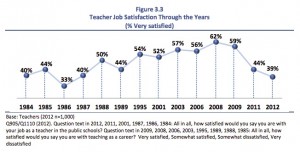Why So Many Teachers Still Hate Their Jobs Now
“I am beginning to hate getting out of bed each morning to teach.”
So reads one comment on a post we put up around this time last year — a post about the precipitous drop in teacher job satisfaction to a 20-year low as measured by the 2011 MetLife Survey of the American Teacher.
Clearly, this commenter isn’t alone, and not only because many others left similar comments.
The 2012 survey results just came out, and teacher satisfaction fell even further. Thirty-nine percent of teachers told the MetLife Foundation they were “very satisfied” with their jobs.
It’s the lowest job satisfaction number the survey’s recorded since 1986.

Screenshot / MetLife Foundation
Teacher job satisfaction since 1984, according to a survey from the MetLife Foundation and Harris Interactive. Click on the image to enlarge.
The survey’s authors peg the decline, like they did last year, on shrinking budgets, ballooning stress and a drop in professional development and collaboration time.
Or, as an anonymous StateImpact commenter put it:
“Teachers have no support, or even curriculum. I am seriously considering leaving the profession. My work is devalued constantly, parents cannot be bothered to help their children, and the only professional support available comes from overwrought colleagues.”
The Wrong Kind Of ‘Change’?
To go beyond the percentages, let’s highlight a few of the comments we received about last year’s low teacher job satisfaction numbers. From John Holbrook:
Bureaucrats unfairly judge teachers using test scores, tie teacher performance and pay to meaningless test data, ruin careers, and keep termination hanging over the heads of teachers. When you point this out, it’s dismissed with “change is hard.” Not if you’re safe behind your desk at an advocacy group, Sandi Jacobs. More importantly, it’s change that we don’t need. Once you control for poverty, American schools are among the best in the world. Problem is, we have a lot of poor kids. Seems like the “change” bureaucrats and advocacy groups should be making is making sure poor kids are fed and that they’re in school. Instead of legislating test scores, I’d like to see someone legislate that. Then we teachers could shrug our shoulders as these same advocacy groups and bureaucrats cry about the impossibility of their task and reply “Yeah, well, change is hard.”
Teachers do not become teachers for the money. It is truly unfortunate that districts, driven by state mandates, are wasting our energy and time on changes….just to appear as if something is being done. Change….just for the sake of change. Teachers need to be allowed to do their job effectively. Instead we are blamed for the failed system put in place…..the “non negotiables” that we are required to teach, that gives us no time to do what really needs done. The public has no idea what we are asked to do and how bad things are. Teachers are powerless…….we need to stop blaming teachers and unions for the problems created by the distrcis and government. I work a minimum of 60 hours a week and teach my heart out……I am tired if the disrespect we receive in return for what we give of our personal lives on top of work time. Yes…there are horrible teachers….lets stop treating the majority as if they are too. Let’s put the blame where it belongs. The government and districts are ruining our children’s opportunity to receive a quality education.
‘Stop Whining’? A Back-And-Forth In Our Comments
What is it about teachers that they assume they should be immune to the same problems as everyone else. Most people have seen their incomes drop because of the economy. And the worst thing a teacher has gone through is see a collegue lose a job. Give me a break. Teachers are like spoiled children. I saw we just fire the one who complain the most and things will get a lot better.
NoWhiningInSchools added on to Suggs’ comment, saying he (or she) is a third-year teacher, “fairly new to the profession”:
The worst part is the complainers! I am surrounded by teachers who say its impossible and don’t even follow the curriculum and complain about being “spied” on by admin, they say they hate their jobs regularly and I just think THEN LEAVE! I have several qualified young new teacher friends who’d be happy to take their spot! I hear “keep doing all that extra (differentiation) stuff and so much small group and your going to burn out fast!
…to which abrilmonte replied:
Ha! you truly sound like you are in your 3rd year. Stay in the same school for at least 6 years, and then you can talk.
Read the full 2012 MetLife Survey of the American Teacher here — and let’s build on this conversation. Should teachers be more receptive to changes? Are they “whining” too much? Or are policymakers and legislators charting a dangerous course?
Share your thoughts in the comments section — just keep our Mailbag rules in mind.


